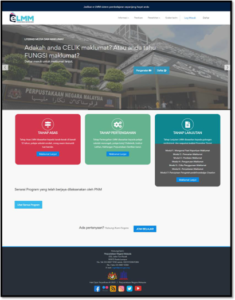Using Technology to Teach Malaysians Media and Information Literacy Skills: e-LMM Portal for Malaysians at the National Library of Malaysia
23 February 2023
Being information literate is a vital skill for 21st-century learning and assessment. In addition, library instruction moves towards e-learning and the use of technology in this era. Here, libraries have to recognise that their role to provide teaching, learning, and research needs to change from traditional to web-based learning. This shift necessitates for libraries to look at new ways to enhance users’ experience by incorporating web-based technology to train users in media and information literacy skills. To this end, the National Library of Malaysia developed a Self-Learning Media and Information Literacy Portal or e-LMM which is an online media and information literacy module to support users’ information literacy skills. e-LMM Portal uses innovative technology and proven pedagogy to build essential information literacy and critical-thinking skills that will help users thrive in their academics, careers, and beyond. e-LMM Portal aims to support lifelong learning among Malaysians to create an information society. The National Library of Malaysia introduced the e-LMM Portal as a guide and platform for users in Malaysia to become information literate individuals.
The objectives of the e-LMM Portal are to enable the Media and Information Literacy Programme that was taught manually to be accessed online through the self-learning system platform. Besides that, the e-LMM portal also aims to facilitate the learning of media and information literacy skills regardless of time and place. It can be accessed 24/7 at users’ convenience. The e-LMM Portal provides three learning levels including, namely, Basic, Intermediate, and Advanced. Each level includes six to seven skill modules as follows:
- Module 1: Identifying Information Needs
- Module 2: Effective Information Searching
- Module 3: Information Evaluation
- Module 4: Information Management
- Module 5: Ethics of Information Use
- Module 6: Dissemination of Information
- Module 7: Knowledge Creation@Knowledge Creation (for Advanced Level only)
All the modules provided in the e-LMM portal target different users based on their education or career. The basic-level module targets primary school students, persons with special needs, and the general community such as rural communities. While the intermediate level targets secondary school students, college students, non-professionals, and newly appointed library staff, the target audience for advanced level are professionals and university students.
The e-LMM portal expands on the traditional learning space by eliminating physical boundaries and performs an important socialisation function for both learners and librarians. The e-LMM Portal offers a lot of benefits and advantages to its members and users such as access at any time based on users’ availability. Users can also learn the skills according to their own pace. Besides that, e-LMM can reach more users and can attract young people to learn information skills because it offers interactive and repeatable learning. Most importantly, the e-LMM is a free learning portal and compatible with any electronic device that has internet connection.
Users need to become a member first before they can access the e-LMM Portal. Registration is free. After registering, the user needs to take a test to ascertain the appropriate level of the user’s information literacy needs. The level of the module is based on the score obtained by the user after taking the test. The e-LMM Portal can be accessed at https://www.elmm.pnm.gov.my
The e-LMM Portal design is firmly embedded in a user-centred philosophy. It incorporates user needs and preferences, forms of information access, and different levels of knowledge to enable user to acquire the basic concepts and instruments and the generic skills and abilities on how to create, organise, analyse, filter, represent, evaluate, retrieve, and use information, serving as a useful resource in the general learning process as well as in users’ professional career or education.

Contributed by Information Literacy Promotion Division, National Library of Malaysia